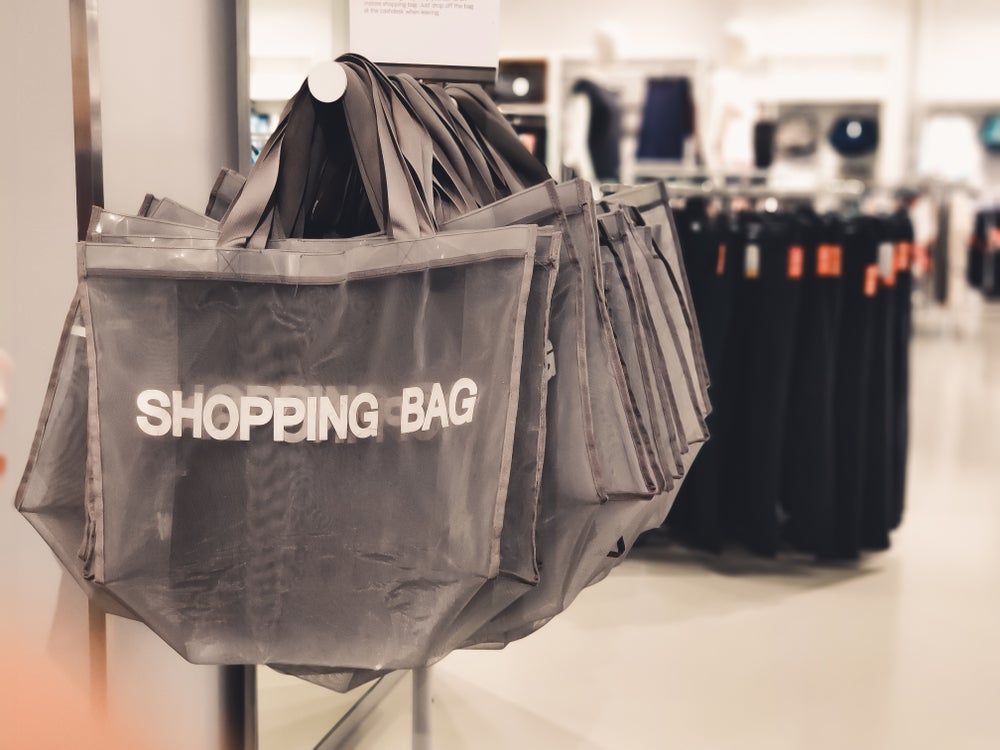
“Not good enough” and “out of step with the public” are among responses to the UK government’s plan to tackle the growing environmental footprint of the fashion industry – and its apparent rejection of recommendations set out by the Environmental Audit Committee (EAC) earlier this year.
Instead of banning the incineration or landfilling of unsold stock and imposing penny levies on garment producers – as the EAC had requested – Ministers say they will launch a review of the Modern Slavery Act 2015 to weigh up its effectiveness, and continue to support the industry via the Sustainable Clothing Action Plan (SCAP), a voluntary agreement co-ordinated by WRAP (the Waste and Resources Action Programme) that set targets to reduce carbon emissions, water and waste.
In February, the UK EAC sent a list of recommendations to the UK government urging it to introduce legislation to require fashion brands and retailers to perform due diligence checks across their supply chains and take more responsibility for the environmental impact of their businesses.
The proposals came on the back of its in-depth probe into the state of the British fashion industry at the end of last year. This saw 16 fashion retailers – including M&S, Next, Primark, Debenhams and online apparel retailers including Missguided, ASOS and Boohoo – quizzed by MPs on what they were doing to reduce the environmental and social impacts of the apparel they sell, amid concerns the so-called ‘fast-fashion’ business model encourages over-consumption and generates excessive waste.
Each retailer was asked about a range of actions and initiatives, including the use of organic or sustainable cotton, limiting the discharge of hazardous chemicals, and the re-use or recycling of unsold stock.
The EAC’s final report indicated the UK buys more clothes per person than any other country in Europe and around 300,000 tonnes of textile waste ends up in household black bins every year, sent to landfill or incinerators. Less than 1% of the material used to produce clothing is recycled into new clothing at the end of its life. It also notes retailers are burning new unsold stock “merely to preserve their brand.”
How well do you really know your competitors?
Access the most comprehensive Company Profiles on the market, powered by GlobalData. Save hours of research. Gain competitive edge.

Thank you!
Your download email will arrive shortly
Not ready to buy yet? Download a free sample
We are confident about the unique quality of our Company Profiles. However, we want you to make the most beneficial decision for your business, so we offer a free sample that you can download by submitting the below form
By GlobalDataIts recommendations to the government included the introduction of laws that require brands and retailers to perform due diligence checks across their supply chains in a bid to tackle labour abuses; charging brands and retailers a penny per garment sold to raise GBP35m to fund an apparel recycling scheme; and tax reforms to reward fashion companies that design products with lower environmental impacts and penalise those that do not.
The government’s response:
The UK government, in its response, outlined the steps it was already taking to tackle the environmental impact of the textile industry, pointing to its 25-year Environment Plan and in its Resources and Waste Strategy.
Specifically referring to the global nature of the sector and its supply chains, the government said the industry has the “primary role” to play in achieving changed, helped by consumer behaviour and underpinned by support “where appropriate” from Government. It said it provided and continues to provide support for the voluntary Sustainable Clothing Action Plan (SCAP), co-ordinated by WRAP, which it noted involves the industry working towards targets to reduce carbon emissions, water and waste.
More work is required to address waste in the supply chain and SCAP signatories are working on plans to address this, for instance through buying specifications and supplier engagement programmes.
It added: “More work is required to address waste in the supply chain and SCAP signatories are working on plans to address this, for instance through buying specifications and supplier engagement programmes.
“The SCAP along with other actions in our Resources and Waste Strategy reflect the Government’s plans in relation to the sector. The Resources and Waste Strategy also outlines our plans to review and consult on measures such as extended producer responsibility (EPR) for five new waste streams, including textiles, so that producers are responsible for the full net costs of managing their products at the end of their useful life, encouraging greater reuse and recycling.”
Referring to the EAC’s recommendation for greater transparency in supply chains, and there being a stronger case for strengthening of the Modern Slavery Act and making it mandatory upon businesses to disclose their approaches to human rights as part of their annual reports, the government said the Transparency in Supply Chains provision in the Modern Slavery Act 2015 has led to “thousands of businesses publishing statements setting out the steps they are taking to address slavery in their global supply chains.” However, it conceded greater transparency is essential to tackle modern slavery and said it was committed to improving business compliance with the Act.
It also said it has launched an independent review of the Modern Slavery Act 2015 to identify where the legislation is working well, what can be improved in its implementation, and whether specific areas of the legislation need to be strengthened.
On the issue of the government working with industry to trace the source of raw material in garments to tackle social and environmental abuses in their supply chains, the government pointed to increasing uptake of blockchain in the industry to aid traceability with companies including C&A, PVH Corp and Kering recently unveiling plans to use blockchain to help bolster the transparency of their cotton supply chains, ensuring the raw materials, fabrics and garments they purchase can be verified as organic or sustainably produced. It said it would work with the clothing industry, including through SCAP, to explore how it can facilitate further action in this area.
It also agreed the priority for dealing with unsold stock should be reuse and recycling, ahead of incineration and landfilling to cut the impact on human health, and said it was developing a mix of policy measures to support reuse and closed-loop recycling. It added it was looking at “how to build on and complement the voluntary approach through the SCAP” and its Resources and Waste Strategy.
“The Strategy has also set out our core principles for developing Extended Producer Responsibility (EPR) schemes, which includes making producers responsible for the full net costs of managing their products at the end of their useful life, using modulated fees or other measures to encourage producers to make more sustainable design, production and purchasing decisions in line with the waste hierarchy and our resources and waste priorities. For example, producers may pay a lower fee for products which are easy to reuse, repair or recycle and a penalty for those that are not. As well as EPR we are examining other policy options as described elsewhere in this response”.
Its full response to all the recommendations can be found here.
The industry response
But the Environmental Audit Committee remained unsatisfied with the government’s response, with chair Mary Creagh, stating “The Government has rejected our call, demonstrating that it is content to tolerate practices that trash the environment and exploit workers despite having just committed to net zero emission targets.”
She added the EAC would be “closely monitoring” steps that the Government claims it is taking to address the problems exposed in its report.
Of the biggest issues it found with the government’s response, the EAC said its proposals for a ban on incinerating or landfilling unsold stock that can be reused or recycled were rejected and penny levies on garment producers; a ban on incinerating or landfilling unsold stock; mandatory environmental targets on retailers with turnovers higher than GBP36m and; a penalty on fashion companies designing products that do not have lower environmental impacts and rewards for those that do, were not accepted.
The govt is content to tolerate practices that trash the environment & exploit workers despite last week’s net zero carbon announcement. Not good enough…#sustainablefashion #ClimateEmergency #netzero #EACFixingFashion https://t.co/jfyE2AMXUK
— Mary Creagh (@MaryCreaghMP) 18 June 2019
“Fashion producers should be forced to clear up the mountains of waste they create,” said Creagh.
Ministers have failed to recognise that urgent action must be taken to change the fast fashion business model which produces cheap clothes that cost the earth.
She added: “The Government is out of step with the public who are shocked by the fact that we are sending 300,000 tonnes of clothes a year to incineration or landfill. Ministers have failed to recognise that urgent action must be taken to change the fast fashion business model which produces cheap clothes that cost the earth.”
On workers’ rights Creagh noted the EAC presented the Government with “the evidence that it has failed to stop garment workers in this country being criminally underpaid, despite its claim that the number of national minimum wage inspectors has increased.”
She added: “The public has a right to know that the clothes they buy are not produced by children or forced labour, however the Government hasn’t accepted our recommendations on the Modern Slavery Act to force fashion retailers to increase transparency in their supply chains.”
Founder of lingerie brands Gilda & Pearl, Diane Houston, said underwear is one category which many people believe cannot be recycled and isn’t accepted in clothes donation so the “gradual movement away from fast fashion is yet to take effect”.
When it comes to underwear, which many believe cannot be recycled and isn’t accepted in clothes donations, the gradual movement away from fast fashion is yet to take effect.
“The attitudes towards the purchase of underwear have, in recent years, been moulded by an industry that stresses affordability over quality. The ability to make clothes cheaply and quickly, regardless of the ethical or environmental ramifications, has been the driving force behind the fast fashion industry. In light of recent attempts to highlight the environmental impact of a consumerist culture, such as climate protests, TV specials and relentless and commendable coverage from the media, shoppers are beginning to prioritise longevity over price. However, when it comes to underwear, which many believe cannot be recycled and isn’t accepted in clothes donations, the gradual movement away from fast fashion is yet to take effect. Instead, pieces that are designed to last little more than a few months make their way into the waste cycle at an alarming rate. The items of underwear that enter this cycle are not made from natural materials like cotton or silk but manufactured and fossil fuel reliant materials like polyester and nylon. The demand for cheap underwear stems from a misconception that underwear, as a rule, should be bought with the intention of throwing it away relatively shortly after. To make any real impact in tackling the fast fashion industry and its effect on the environment, this misconception needs to be overcome.”
Anna Bryher, advocacy director of campaign group, Labour Behind the Label added the “short-sighted, knee jerk response to a set of progressive steps to address plastic waste and sustainability in fashion is unwelcome.”
“The fashion industry is key in the war on plastic and brands and government need to act jointly to address waste. We urgently need legislation that will create some minimum guidelines for companies to follow. Indeed, even some companies are asking for legislation to level the playing field between those brands taking some measures to improve sustainability and those that are not. This government shows it is behind the times by sticking to the fallacy that voluntary initiatives are all that is needed to turn this industry around. It is clearly not the case.”
However, in a statement this morning, a government spokesperson denied the allegations it was “rejecting” the recommendations adding it is committed to managing the environmental and social and impacts of clothing, particularly in this era of fast fashion, and its response sets out a clear plan to tackle this important issue.
“It simply isn’t true to say we are not accepting the Committee’s recommendations – we are tackling the environmental impacts of ‘fast fashion’ and much of what the committee would like to achieve is already covered by government policy.
“In our landmark Resources and Waste Strategy we will take forward measures including developing proposals and consulting on extended producer responsibility (EPR) and higher product standards for textiles. This would make producers responsible for the full cost of managing and disposing of their products after they’re no longer useful.
“Through the ground-breaking Modern Slavery Act, the UK was the first country to require businesses to report on the steps they have taken to tackle modern slavery in their own business and throughout their supply chains. The Prime Minister announced last week that the Government will create a new central online reporting service for modern slavery statements to give consumers the ability to make more informed choices about where they shop.”
It also noted by the end of 2025 it will have reviewed and consulted on measures such as Extended Producer Responsibility and product standards for five new waste streams, two of which it plans to complete by 2022.
Last week the government unveiled a GBP4.7m (US$5.95m) fund to help boost the recycling of plastic packaging and textiles – and said it was seeking innovative ideas to back.
Kerry Gwyther, head of commercial regulatory at law firm TLT, comments: “Historically, most governments prefer to see the effects of self-regulation before introducing legislation: this is certainly true of the initiatives in relation to single-use plastics in packaging as currently being promoted by a number of supermarkets. The government has pointed to the voluntary waste and resources action program (WRAP) and the associated voluntary sustainable clothing action plan (SCAP), co-ordinated by WRAP, which sets targets to reduce carbon emissions, water and waste.
The fashion and clothing sector should not breathe a sigh of relief that legislation now seems remote. The greatest pressure that is likely to come to bear on the fashion industry is from the consumer.
“However, the fashion and clothing sector should not breathe a sigh of relief that legislation now seems remote. The greatest pressure that is likely to come to bear on the fashion industry is from the consumer i.e. the ‘Blue Planet effect’ with consumers becoming ever more focused on the durability of products, their source, production and ultimate method of disposal. We are already seeing the effects of this with our retail and consumer goods clients all the way through from point of sale to manufacture and sourcing.”
Click here to read just-style’s full coverage of the EAC investigation.







